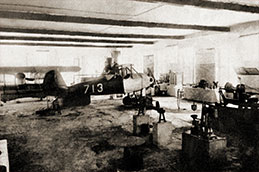
Deng Yuemo also known as Shu’an was born in May 1896. Deng’s ancestral home is Shangzha Village, Xiangshan County in Guangdong Province. He went to Bowen College, a Christian school, in 1908. In 1914, he attended the college entrance exam. A question on the Chinese exam was to write how “Kongming compared himself to Guan Zhong”. He happened to have read the Three Kingdoms, and was admitted to the college. He started his pre-studies at Peiyang University in 1915 and, upon graduation, continued his undergraduate studies in Mining and Metallurgy in 1917.
Deng Yuemo graduated from the Department of Mining and Metallurgy and obtained his Bachelor of Engineering in June 1920. In December 1920, on recommendation by an American professor at Peiyang University, he went on to pursue his self-funded studies in the US, first on laboratory instruments in Gray Works in Chicago, then on hydraulic engines and generator manufacturing in Allis Chalmers. By the end of 1922, Deng returned to China and engaged himself first in industrial technologies and later in teaching. In 1930, he started teaching at Peiyang University, first as a professor of chemistry, then mechanical engineering, and later in hydraulics.
According to the regulations set by the Ministry of Education of Nanjing Republic government, the establishment of laboratories were mandatory in engineering colleges. However, it was well known at that time that laboratories, instruments and devices were mainly obtained through importing from overseas and this was extremely expensive. A 50000-pound material testing machine would cost more than US $15,000. Meanwhile universities were receiving very limited government funds which made the setting up of laboratories unaffordable. To solve the problem, Deng decided to design and manufacture the devices himself.
From 1932 to 1933, with the support of the Mechanical Research Community, Deng succeeded after numerous difficult experiments. He assembled, for the material testing lab and the hydraulics lab, a series of instruments and devices, such as oil pressure testing device, the impact testing machine, the cement tensile testing machine, the hydrometer, the mixed flow pump, two stage pump, and the hydro turbine. Apart from providing for the material testing laboratory and the hydraulic laboratory at Peiyang University, instruments and devices were also provided for the laboratories of Shandong University, Sun Yat-sen University, Henan University, Chongqing University, Jiaozuo College, Henan Hydro College and other institutions. The 50000-pound material testing machine was the first all-function material-testing machine designed and assembled by the Chinese. It could run a series of static tests on the mechanical capacities of testing materials. At that time, most of the material-testing machines used in university laboratories were made by Deng Yuemo.
In the field of power machinery, Deng Yuemo designed and assembled a gas engine, an internal combustion engine powered by CO2 released when using coal in the gas generator. For the mechanical processing equipment, Deng developed, in the factory attached to Peiyang University, a lathe for processing large-scale work pieces. Deng Yuemo therefore became one of the pioneers who was active and creative in the research and teaching of mechanical equipment in China. In 1934, the Aircraft Engineering Research Association of Peiyang University was established, and Deng Yuemo, the then professor in the Department of Mechanical Engineering, Director of Materials lab, resolutely took over the task of aero engine testing, and successfully built the first aero engine in China.
After the victory of the War of Resistance against Japanese Aggression, Deng Yuemo resumed his teaching career in the Department of Mining and Metallurgy at Peiyang University, continuing with his teaching, and mechanical design and manufacturing. In the Reorganisation of Colleges & Departments of 1952, Deng Yuemo was transferred to the China College of Mining and Technology to teach in the Department of Mechanical Engineering, where he was devoted to the research and teaching in the field of mechanical engineering. He tutored postgraduate students, worked on engineering designs, and provided technical consulting services. His contribution in all those fields earned him a recognition from Chairman Mao Zedong and Premier Zhou Enlai, and compliments from Peng Zhen, Secretary of the Beijing Committee of the Communist Party of China.






